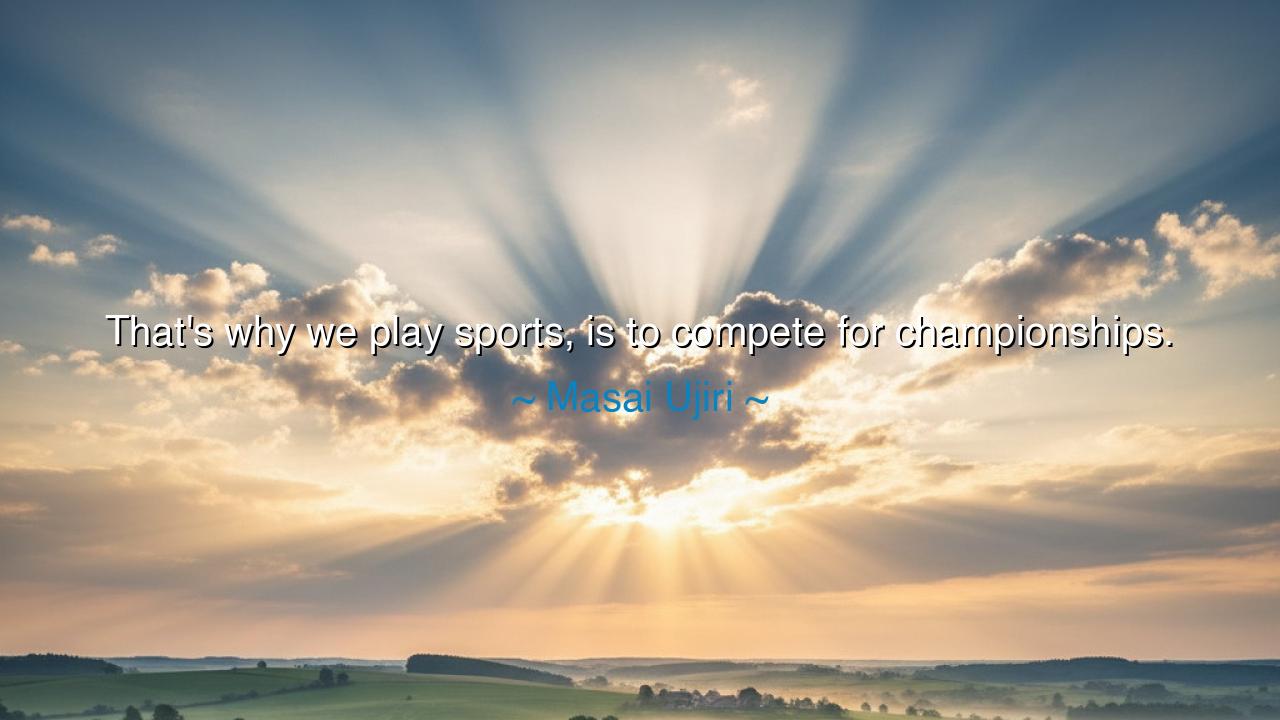
That's why we play sports, is to compete for championships.






Masai Ujiri once declared with unwavering conviction: "That's why we play sports, is to compete for championships." These words strike not as a mere observation but as a call to the essence of why men and women strive, sweat, and endure. For in competition lies the test of the spirit, and in the pursuit of championships lies the hunger for immortality. To play for leisure may satisfy the moment, but to play for greatness ignites the soul to burn with purpose.
From the dawn of civilization, the games of the people have been more than amusement. In ancient Greece, the Olympic Games were offerings to the gods, where champions became legends and their names were etched upon stone. They did not gather in Olympia to pass the hours, but to seek crowns of olive leaves that symbolized honor greater than wealth. Even then, the ancients knew that the heart of sport is not idleness but glory — not simply to play, but to win.
When Ujiri spoke, he gave voice to a truth that every athlete feels yet few can speak with such simplicity: that sports are the field where ambition becomes action. The sweat that drips, the lungs that burn, the bruises borne upon the flesh — all these are not endured for play alone, but for the chance to stand upon the summit as a champion. To compete without striving for the crown is to wield a sword without a duel, to light a torch and hide it under the earth.
History itself offers testimony. Consider Michael Jordan, who once said he did not play for the sake of the game alone, but for the rings, the titles, the championships that defined his era. His greatness did not come from shooting a ball into a basket, but from his relentless pursuit of being the best, season after season, until his very name became synonymous with victory. Just as Ujiri’s words remind us, Jordan’s life showed us: sports are a battlefield where only those with the hunger for championships rise into legend.
Yet let it not be misunderstood. The pursuit of championships does not mean the dishonoring of fair play, nor the trampling of opponents. On the contrary, it is precisely the noble duel, the clash of equals, that gives the crown its meaning. A title won without struggle is no title at all, just as a mountain climbed with wings is no conquest. The worth of the championship lies in the pain endured, the rivalries honored, the resilience tested. It is the crucible of competition that forges true glory.
And what lesson do we draw from this, children of tomorrow? That in life, as in sports, we must not move aimlessly, but set our eyes upon the championships of our own existence. For some, this championship is the completion of studies; for others, the building of a family; for yet others, the pursuit of mastery in a craft. Whatever the crown may be, let it be pursued with the spirit of the athlete — with discipline, courage, and unrelenting will.
Practical actions are clear: choose your championship, dedicate yourself to its pursuit, and never be content with mediocrity. Train your mind as the athlete trains the body, sharpen your character as the swordsman sharpens his blade, and when the hour of competition arrives — whether in work, love, or duty — enter the arena with the fire of one who knows why he fights. For only then will your victories shine not as accidents, but as earned destinies.
Thus, Masai Ujiri’s words are not just about the courts of basketball but about the very courts of life. To live without striving for a championship is to wander without a star. To compete for championships, whether in sport or in spirit, is to honor the gifts of strength, mind, and will that the heavens have bestowed upon us. And so, let us play — but let us play for crowns, for glory, and for the eternal echo of our names in the halls of time.






AAdministratorAdministrator
Welcome, honored guests. Please leave a comment, we will respond soon